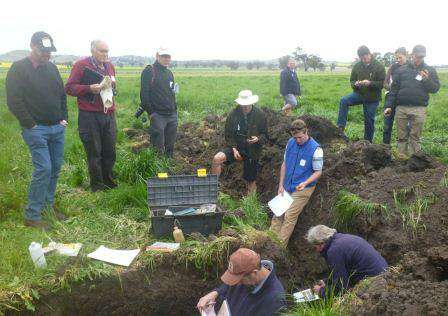'How does my pasture grow?' is a question many farmers ask, and if they are not they should be! We see what's happening on the surface of pastures, but to check out what is going on underneath in the soil, we need to get down and dirty. That's exactly what farmers from the Strathbogie Ranges will be doing at an upcoming field day.
The Goulburn Broken Catchment Management Authority's (CMA) Beyond SoilCare project together with the Department of Primary Industries (DPI) is hosting a soil pit day on 28th May 2012 to look at the nuts and bolts of soil management. The soil pits will be at the site of the Strathbogie Alternative Fertiliser Trials, established by the Strathbogie Tableland Landcare Group.
'How does my pasture grow?' is a question many farmers ask, and if they are not they should be! We see what's happening on the surface of pastures, but to check out what is going on underneath in the soil, we need to get down and dirty. That's exactly what farmers from the Strathbogie Ranges will be doing at an upcoming field day.
The Goulburn Broken Catchment Management Authority's (CMA) Beyond SoilCare project together with the Department of Primary Industries (DPI) is hosting a soil pit day on 28th May 2012 to look at the nuts and bolts of soil management. The soil pits will be at the site of the Strathbogie Alternative Fertiliser Trials, established by the Strathbogie Tableland Landcare Group.
Three soil pits will compare the top of the hill, the mid slope and the lower part of the landscape. The pits will be 1.5m deep, the entire depth of rooting of major pasture and crop plants, allowing farmers to look at the entire soil profile pasture and crop plants interact with. Getting below the surface illustrates soil structure and highlights limitations to the soil's productive potential.
At the Strathbogie site, we expect to see the white 'spewy' layer that is often apparent when the ground is disturbed, and often proves difficult for management. Leading soil management experts, Cath Botta and Peter Ockenden, will run through the physical characteristics of the soil and that will be related back to vegetation and pasture management.
Mark Cotter, Manager Land Health Program at the Goulburn Broken CMA, has been working with farmers and their soils for 20 years, "In my experience, as soon as the backhoe fires up we get farmers coming from all over to have a look at what's going on in the soil," Mark said. "It's a great way to put the information gained at recent soil test interpretation workshops into action, and to look at the physical limitations to productivity." "It's also a good opportunity for farmers to come together with their neighbours and share information; mistakes, challenges, things that worked and questions that have been in the back of their minds for a while."
The day is open to all, for more information and to register to attend please contact Greg Bekker on 5761 1631.
RELEASE ENDS
Soil Pit at Dookie College
